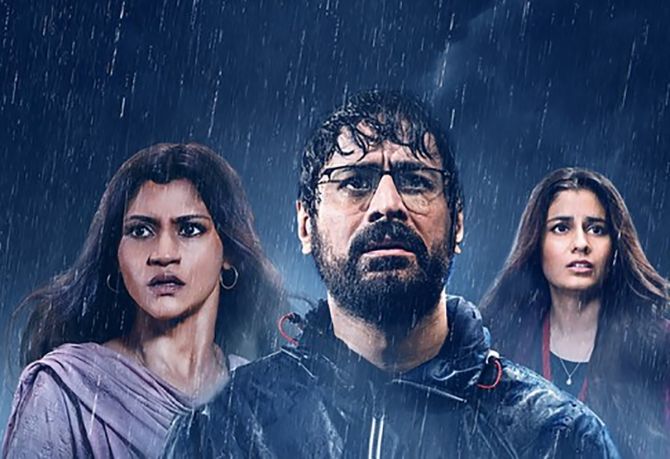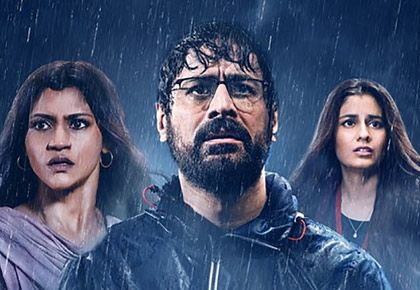Season two once again goes for dramatic overkill despite the spine-chilling gravity of the true events it is based on, observes Mayur Sanap.

After capturing the fretful night of 26/11 in its debut season, Nikkhil Advani adopts the environmental mayhem to tell stories from the emergency room of medical professionals in season two of Mumbai Diaries.
This new season takes us back to the dismal memories of July 26 when the city was hit by the record-breaking downpour in 2005. For the continuity sake, the story is set in 2009 (following the events of the first season) and much of this fictional account is skewed towards the travail of healthcare heroes and their sheer tenacity in the face of crisis.
But while season two shows significant improvement on some of the character arcs and their stories, it once again goes for the same dramatic overkill despite the spine-chilling gravity of the true events it is based on. The result is an engaging drama that struggles to strike the right blend of thrill and emotions.
Mumbai Diaries: Season 2 is one of those medical dramas where every recognisable element is in full swing: Determined doctors, their interpersonal relationships, and the looming danger of something ominous, in this case, severely bad tempered weather.
It is a predictable template but most of this works, mainly because of the story's emotional draw and the collective shine of its top-drawer cast.
Much like the first season, the series sets the backdrop of a catastrophic event to depict the efforts of medical workforce, their personal lives and how they deal with emergency situation inside the fictional Bombay General Hospital (modelled on south Mumbai's Cama Hospital).
Mohit Raina returns as star surgeon Dr Kaushik Oberoi, who is going through trials and tribulations in his professional life for his allegedly reckless actions during the 26/11 night. While most of his staff is in his favour, a few of them go against him.
Personally, Kaushik is in happy space as he readies to welcome his first child with wife Ananya (Tina Desai). As soon as the city is consumed by torrential rains, the doctors are forced to weather the storm to do what they know the best: Saving the lives.
The recurring thought that comes to mind while watching the eight episode show is that the real life event was so grave, then why not keep it subtle?
Advani, who serves as creator and director, is more interested in dialling up emotions with melodramatic moments rather than creating a disquieting impression. This banal approach only brings forth cheesy soap opera feel to the drama.
Where the show suffers the most, just like the previous season, is in its script. There are some thin characterisations and unnecessary subplots at play which is grating at times.
Despite its meaty subject matter, writers Yash Chettija and Persis Sodawaterwala further weave in a bunch of muddled plotlines that don't do service to its central plot. This includes a nurse purloining hospital supplies, the coming out struggle of a teenage patient, and the severely injured rescued young girl.
In an attempt to show the grittiness of medical procedures/situations, the show goes overboard in showcasing the gory visuals which feels completely unnecessary.
The camerawork, which was so sleek in the previous season, falls short here to bring home the real terror of devastating floods.
While the single-shot scenes are still interesting to look at, the visuals of downpour are a mess of actions and imagery that don't add up to a cohesive vision. This is especially glaring in the bridge collapse scene or panicky surviving of Tina Desai's pregnant woman.
Despite the odds, the very reliable cast once again rises to the occasion and makes the show eminently watchable.
Mohit Raina is solid as ever in his lead turn. His scenes with Tina Desai are some of the most emotionally engaging bits in the show, and both of them deliver a heartfelt performance.
Konkona Sen Sharma as Dr Chitra Das is given more to do this time around, and she skillfully portrays a vulnerable woman fighting her inner demons as she bumps into her wily ex-husband, played masterfully by Parambrata Chattopadhyay.
Mrunmayee Deshpande, as emotionally volatile Dr Sujata Ajawale, gets the best written role this season, and the talented Marathi actress leaves a lasting impact.
Shreya Dhanwanthary;s unscrupulous TV journalist Mansi Hirani gets a redemptive arc and it's nice to see that the show gives room for her self-reflection.
Satyajeet Dubey is pleasant as Dr Ahaan Mirza who falls for Konkona's Chitra. Despite his vague characterisation, the actor's affable presence makes it believable.
Both Prakash Belawadi and Natasha Bharadwaj suffer from the monotony of their characters and don't get anything significant to do.
The most enjoyable performance comes from Balaji Gauri as head nurse Mrs Cherian, the matriarch figure of sorts to the hospital, who is left to deal with unlimited problems with limited resources. She is crackling and steals every scene she is in.
Ridhi Dogra as the new entrant Dr Sandhya intrigues and perhaps we will get to see more of her if there is a next season.
As the show reaches the denouement, it regains vigour in its very exciting final stretch that ensures it concludes on a satisfying note. But given its fool-proof premise and consistently impressive cast, one wishes the end result was more than just a decent-enough watch.
Mumbai Diaries: Season 2 streams on Amazon Prime Video.

- MOVIE REVIEWS

